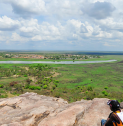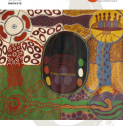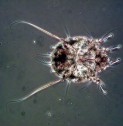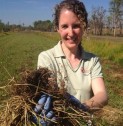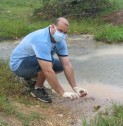Not seeing the timeline animation?
If you are using Internet Explorer please update your browser to Version 8 or above;
To check this press the F12 key, go to Browser Mode and select IE8 or above.
Do not choose compatibility view.
-
'Living in the North' seminar held in Darwin
'Partly as a consequence of Harry Giese's powerful speech, but also because of his continuing advocacy, persistence and enthusiasm', the Menzies Foundation holds 'Living in the North', to identify the health challenges of living and working in tropical regions.
-
A step towards new TB treatments
Menzies discovers a link between nitric oxide levels and tuberculosis, a disease that affects eight million people globally each year. This paves the way for new treatments, especially for drug resistant TB.
-
B.strong Brief Intervention Training Program launched
The B.strong Brief Intervention Training Program, to be delivered by Menzies, was launched by QLD Minister for Health and Ambulance Services, The Hon Cameron Dick.
-
Brain damage from petrol sniffing reversible
Also in 2005, researchers show that two years' abstinence from petrol sniffing results in substantial brain function improvement.
-
Community-based researchers graduate
The first cohort of community-based researchers graduated with a Certificate II in Community Health Research.
-
Community-based TB drug-resistance survey published
In 2005, Menzies publishes the first community-based TB drug-resistance survey in Indonesia, which had the world's third highest number of TB cases.
-
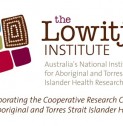
Cooperative Research Centre for Aboriginal and Tropical Health established
Menzies drives the establishment of the Cooperative Research Centre for Aboriginal and Tropical Health in 1997. Lowitja O'Donoghue serves as the inaugural chair and the centre is later renamed the Lowitja Institute.
-
Darwin workshop results in creation of Menzies
A Darwin workshop, 'Towards a School of Health Research in the Northern Territory', is held. As a consequence of these meetings, the Menzies School of Health Research is created in Darwin.
-
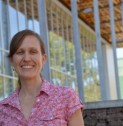
Developed a pain-free treatment for skin sores
Set to benefit the millions of children worldwide who suffer from this infection.
-
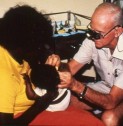
Discovery by ear health researchers
Ear health researchers discover that the disease otitis media, also known as middle ear infection, is linked with poor development of communication skills in children.
-
Disparity in rates of kidney disease and transplants
That same year, researchers find that Indigenous patients receive kidney transplants at approximately one third the rate of non-Indigenous patients, despite having higher rates of kidney disease. They also reveal that Indigenous patients face barriers to joining organ transplant waiting lists.
-
Ear and hearing centre of excellence unveiled
The NHMRC funded Menzies CRE in Indigenous Childrenís Healthy Ears (ICHEAR) was launched in April 2015. Menzies' Professor Amanda Leach leads the CRE which aims to significantly improve ear and hearing health among Aboriginal and Torres Strait Islander Children.
-
East Timorese refugees require Menzies' expertise
Following the violent and destructive events surrounding the independence vote in East Timor in August, Darwin receives 1800 refugees from Dili. Staff and students of the Menzies School of Health Research help in the medical screening process and use their expertise in respiratory and infectious diseases to meet health care needs, converting part of the School into a reception area for immunisations.
-
Emergency assessment mission to East Timor
In October, Dr Nick Anstey and Ms Kay Withnall represent the School on a TB/malaria emergency assessment mission to East Timor on behalf of the World Health Organization.
-
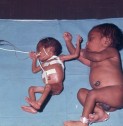
Fourth wave of data collection for longest study of Aboriginal people in Australia.
The Aboriginal Birth Cohort study, which involves almost 700 children born in the mid-1980s, aims to identify early, the risk of developing chronic diseases and help target intervention strategies.
-
Harry Giese becomes founding Chairman of Menzies Foundation NT
Harry Giese accepts an invitation to become the Menzies Foundation's founding Chairman in the Northern Territory.
-

Hearing for Learning Initiative launched
A community-based service enhancement program. It aims to integrate locally-based ear health project officers into existing services to assist Aboriginal and Torres Strait Islander children with ear and hearing problems.
-
HOT NORTH funding awarded
Awarded a $6 million grant from the Australian Government to lead the Improving Health Outcomes in the Tropical North: A Multidisciplinary Collaboration.
-
Improving cancer care for Indigenous Australians
In line with evidence that cancer is now the second leading cause of death among the Indigenous population, Menzies identifies key barriers to accessing care, as well as the highest priority support needs for Indigenous cancer patients.
-
Incorporated under our own legislation
The Menzies School of Health Research is incorporated under its own legislation on 12 December 1985.
-
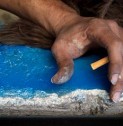
Indigenous smoking rates down
Researchers probe smoking habits among Indigenous Australians, revealing a significant decline in heavy smoking, as well as a spike in successful quitting rates.
-
Innovate RAP launched
Through our Innovate Reconciliation Action Plan and by embracing the focus areas of respect, relationships and opportunities, we will do more and do better in addressing health inequalities and inequities for Aboriginal and Torres Strait Islander peoples.
-

Launch of Substance Abuse Unit
In 1992 a new Substance Abuse Unit is launched, headed by renowned sociologist Dr Peter D'Abbs. Four years later, Menzies reports on alcohol regulation trials and the control of petrol sniffing.
-
Leishmania discovered in Australia
In a further lab discovery in 2006, scientists uncover a previously unknown species of the Leishmania parasite that causes ulcerated skin lesions. Until this breakthrough, Australia was considered one of the only continents in the world free of Leishmania parasites.
-
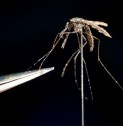
Malaria discoveries translate into treatment trials
Scientists discover that malaria deaths in children (2003) and adults (2007) are linked to low levels of the amino acid arginine and low levels of nitric oxide. This leads to clinical trials investigating new intravenous treatments for severe malaria.
-
Malaria trials help millions
We lead initiatives across the Asia-Pacific, working to solve new challenges at the end stages of malaria eradication. Our work is critical to address resistance to existing treatments, a problem which threatens 2.2 billion people worldwide. We have identified an active drug that works - primaquine - and are gearing up to lead a regional roll-out of new treatment regimes that incorporate its use. Our trials have changed the way millions of people are treated and have prevented many thousands of deaths.
-
Menzies 2021 Strategic Plan launched
Menzies 2021 demonstrates Menziesí commitment to undertake research that is world-class, translatable, and that makes a difference to the lives of people throughout Australia and across the region.
-
Menzies celebrates 30 years of scientific discovery and public health achievement
-
Menzies enters new stage of development and growth
Founding member of the board of governors, Harry Giese, and chairman, Professor Richard Gye, retire in the early 1990s, marking the end of Menzies' first stage of development and growth.
-
Menzies initiates collaborations with South-East Asia
In the early 1990s, work expanded into South-East Asia with a project examining leprosy and HIV. By 1996, the Indonesian and Northern Territory governments jointly funded research fellowships exploring the management and prevention of tuberculosis and malaria in Eastern Indonesia.
-
_with_Jessica_Young_timeline.jpg&w=123&h=126)
Menzies research shines on the national stage
Menzies School of Health Research was awarded federal funding for 11 competitive grants and fellowships to help improve outcomes for disadvantaged populations in Australia and the Asia-Pacific region.
-
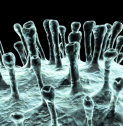
Menzies responds to COVID-19 pandemic
We are actively supporting the Northern Territory, Queensland and Timor-Leste governments in their responses to COVID-19. This includes providing high-level strategic advice, training, enhancing testing and guidance on infection control and patient care.
-
Menzies scores top marks
The Australian Government's Excellence in Research for Australia initiative described Menzies' performance as 'outstanding' and 'well above world standard'. Menzies achieved a 'five out of five' ranking.
-
Menzies signs memorandum with Timor-Leste
Menzies signs a Memorandum of Understanding in 2011 with the Timor-Leste Ministry of Health to found a long-term partnership for health development.
-
Menzies' founding director appointed
After being appointed as Menzies' founding director Professor John Mathews arrives in Darwin in January 1985.
-
Menzies' researchers give technical advice to East Timorese
In February, Dr Paul Kelly converts Anstey's and Withnall's preliminary findings into a program of support for the East Timorese TB control program. Dr Anstey and Dr Bart Currie give technical advice on malaria, dengue fever and other infectious diseases to local health care providers.
-
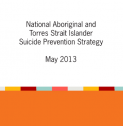
National Indigenous Suicide Prevention Strategy report
Nationwide public consultations on Indigenous suicide prevention are held with over 500 people, resulting in the National Indigenous Suicide Prevention Strategy report, later delivered to the Australian government.
-
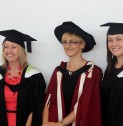
New doctorate program
2009 sees the launch of a new professional doctorate program.
-
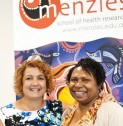
New Indigenous cancer research team
A new Indigenous cancer research team is created in 2011 led by Associate Professor Gail Garvey in Brisbane.
-
New Menzies Act released
In October, the Menzies School of Health Research Amendment Act 2016 was passed. The Act amended existing legislation to reframe the composition of the Board to ensure that it will be an independent, influential and skills-based with a governance framework.
-
New test to diagnose scabies
In the same year, scientists identify key scabies mite antigens. This discovery enables the development of a test to diagnose scabies.
-
NHMRC double success
Menzies is awarded two out of only three available 'Indigenous Health Research Centres' funded nationally by the National Health and Medical Research Council, receiving $5 million over five years to open Centres for Research Excellence in Lung Health and Cancer Research.
-
.jpg&w=123&h=126)
Northern Territory Young Achiever of the Year Award awarded
Ms Louise Martin wins the Northern Territory Young Achiever of the Year Award. Louise is the first Indigenous person to be awarded a science degree at the Northern Territory University, first class honours at the Menzies School of Health Research, studying variation in Haemophilus influenzae.
-
One21seventy program doubles clinic attendance
Our One21Seventy program - with continuous quality improvement systems, e-learning training modules and staff capacity building initiatives for Indigenous Health Services - has resulted in up to 100% increases in clinic attendances and delivery of prescribed treatment plans.
-
.jpg&w=123&h=126)
Opening brings together foundation stakeholders
24 June 1984: The opening ceremony of the School brings together its foundation stakeholders: The NT Government, the University of Sydney and the Menzies Foundation.
-
Opening of a new office
In 1986, the Alice Springs research office opens.
-

Opening of the Centre for Child Development and Education
The Centre for Child Development and Education (CCDE) opens. A partnership between Menzies, Charles Darwin University and the NT Government, with major funding from the Ian Potter Foundation and the Sidney Myer Fund.
-
Passing the Menzies School of Health Research Act
The Northern Territory Government passes the Menzies School of Health Research Act 1985 in November of that same year. This decrees Menzies as a statutory authority answerable to the Minister for Health.
-
Potentially fatal disease melioidosis linked to water and grasses
Ground breaking studies published in 2011 uncover the environmental niches of the melioidosis bacterium in bore water and in native and imported grasses.
-
Prime Minister Malcolm Turnbull opens new building
Menzies had the pleasure of welcoming Prime Minister Malcolm Turnbull to officially open its new buildings on the Royal Darwin Hospital and Charles Darwin University campuses.
-
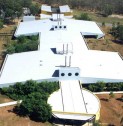
Public Health courses launched as staff move into new building
Postgraduate coursework programs in public health are offered from 1994, and Darwin staff move into a new Commonwealth-funded building at the Royal Darwin Hospital campus in Darwin, launched by federal health minister, Dr Michael Wooldridge, in 1996.
-
Ramaciotti Biomedical Research Award
The Ramaciotti Biomedical Research Award was awarded to Menzies to establish the Ramaciotti Centre for Excellence in Building Regional and Remote Biomedical Capability.
-
Relationship with Northern Territory University considered
At the first Menzies Foundation National Seminar in Melbourne, in October, Giese suggests a working relationship between the Foundation and the embryonic Northern Territory University to examine improving the health and wellbeing of the people of the north.
-

Researchers discover a new silver species of Staphylococcus
Menzies School of Health Research scientists uncover two new species of staphylococcus: S. argenteus and S. schweitzeri
-
RHD Australia launched
In 2010, Menzies launches RHDAustralia, a Commonwealth-funded body coordinating a national approach to ARF and RHD, with an aim of eradicating this disease.
-

Rheumatic heart disease guidelines released
Menzies leads the development of national guidelines for the diagnosis and treatment of acute rheumatic fever (ARF) and rheumatic heart disease (RHD), published by the National Heart Foundation of Australia and the Cardiac Society of Australia and New Zealand.
-
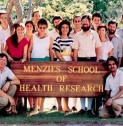
School established
School established in temporary facilities on the grounds of Royal Darwin Hospital in June 1984.
-
Start of a landmark study on the deadly tropical bacterial disease melioidosis
The Darwin Prospective Melioidosis Study started on October 1st 1989, documenting over 800 cases to date. Mortality from melioidosis in the NT decreased from over 30% in the early 1990s to 10% in 2013.
-
Strong Teeth for Little Kids Project lauded
That same year, the Strong Teeth for Little Kids project leads to children in NT remote communities receiving fluoride varnish to improve oral health. This is later recognised as one of the ten best NHMRC research projects in Australia.
-
Tackling heart disease and diabetes in Indigenous Australians
Community-based interventions to reduce cardiovascular disease and diabetes in Indigenous Australians begin in 2002.
-
Timor-Leste office opened
Menzies established an office in Timor-Leste, with 18 staff and MOUs with key government departments. Our projects in Timor-Leste support testing and surveillance for AMR and health systems strengthening.
-
Vivax malaria can be fatal
Landmark research from 2008 finds that the malaria species, Plasmodium vivax, is linked with severe and fatal disease. This discovery challenges the dominant scientific belief that vivax malaria is benign.

